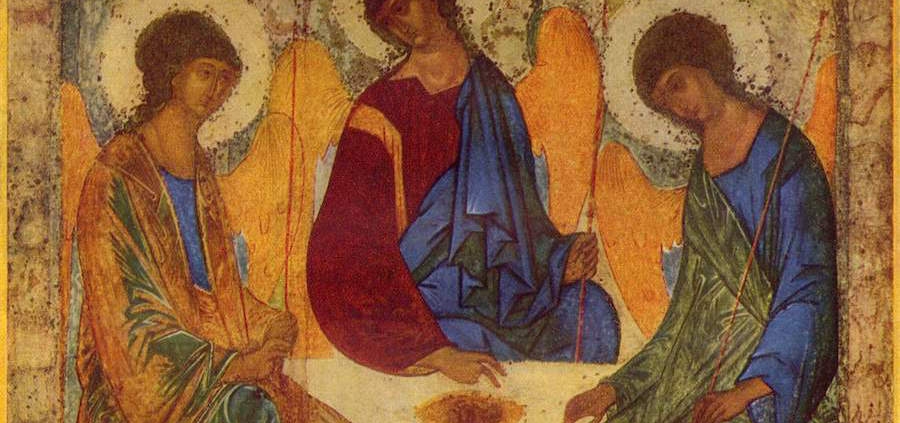God, Adam, Eve, and Us by Fr. Bob Bonnot
The first chapter of the Book of Genesis names the Creator Elohim, a plural Hebrew word for “gods.” Note that Elohim is used notwithstanding the fundamental biblical message that God is one! The verbs and adjectives used with Elohim, however, are singular, implying a oneness of the plurality. The account portrays a perfectly coordinated collaboration of a Speaker, Words spoken, and a blowing Wind. Together, this threesome transform chaotic land, water, and darkness into the splendor of a universe. The Speaker forms creation Word by Word, and the breath of the Wind (Ruah in Hebrew), a divine energy that activates the Word, brings it to life.
The wording and imagery of Genesis 1 intrigues us further. On the sixth day Elohim says, “Let us make man in our image, after our likeness. Let them . . .” We see that humankind too is one, but plural, male and female, blessed by the creator to be fertile, generating others beyond themselves, multiplying to “fill the earth.”
Genesis 2 names the creator Yahweh, reflecting the special oneness of Israel’s God and ours. Yahweh speaks and makes things happen, yet the threeness remains. We Christians usually refer to this One-who-is-three as the Trinity, a “trio” or triplet if you will, all emerging from singular divine stuff. In Genesis 2 Yahweh names the twosome of humankind: the male is Adam, a creature shaped from stardust, earth’s soil; and the female made of Adam’s stuff is Eve, source of life, a mother.
Thus Genesis 1 and 2 portray a singular but differentiated creator. Adam and Eve mirror them. St. Bonaventure’s theological reflection would later broaden that insight to see the stamp of this singular trio on all creation. Thus communication, cooperation, and collaboration are more central to creation and our being human than any individuality, independence, or “going it alone.” We become what we are in a process that starts with and involves others. Isolated, we are neither self-creating nor creative. Heroizing any individual as self-made is false. As an African proverb puts it: I am because we are.
In Genesis 2, Yahweh enters creation, walks in the garden, and talks with the trio’s mirroring selves. Adam and Eve come into their own as persons, inescapably related to one another. They are no longer separate male and female, fertile partners charged to multiply. Adam is fashioned from stardust and Eve is fashioned from him. Adam sees Eve as the bone of his bone and flesh of his flesh. They are one, side by side. They are immersed in the universe, part of creation, grounded in the garden. They are not above or separate from it. They are to embrace all that lives there—to enjoy it, name it, communicate with it, coordinate and collaborate with it, and so enable humans like themselves and all creation to flourish.
That remains our human charge and challenge. When we fail to see Elohim-Yahweh in ourselves and all creation; when we stand apart, outside and above the rest of creation; when we give ourselves over to abusing, subduing, dominating, plundering, and destroying one another and creation, we distort reality and ourselves. We threaten our own well-being, our survival. We distort our mirroring of our triplet creator. To succeed as humans, we need others like us, others we respect as fully human as are we, others with whom we relate, others who make us fertile. We are one.
The triplet creator cannot create if one is missing. The Speaker needs the articulation provided by Word, and the Word needs the energy of the Wind to become real, embodied, incarnate. That energy is Love. Love binds the three as one, humans as one, creation as one. Humans, males and females and those on the spectrum between those two, need love to bind them together and to creation. Love makes them generative and fruitful. Their contribution to life can take many forms, including birthing other persons fully embraced by and imprinted with their love.
The Genesis story of creation and its completion in Adam and Eve sketches the mission and dynamic of the entire human community. We humans mirror the trio first grasped as Elohim-Yahweh. We exist to contemplate their creativity and to “do likewise.” We are part of creation. We are to communicate and cooperate and collaborate with one another as do Speaker-Word-Wind, aka Father-Son-Spirit, so we too can bring forth what is good. We are to see the image and imprint of the divine trio in those who are like us yet different, and in all that exists. We are to respect and sustain the garden and creatures entrusted to us as sacred. We are to listen to the Word the creator speaks and allow the Wind to blow through us so we will grasp, understand, experience, and appreciate all of creation as not just good, but very good. Without that self-understanding we find ourselves alienated, alone, outside the garden, apart from creation, not part of it, feeling to be just an I, not a we, not an us.
Bob (Bernard R.) Bonnot is a priest of the Diocese of Youngstown, now retired, serving as the Executive Director of the Association of U. S. Catholic Priests (AUSCP).





Leave a Reply
Want to join the discussion?Feel free to contribute!